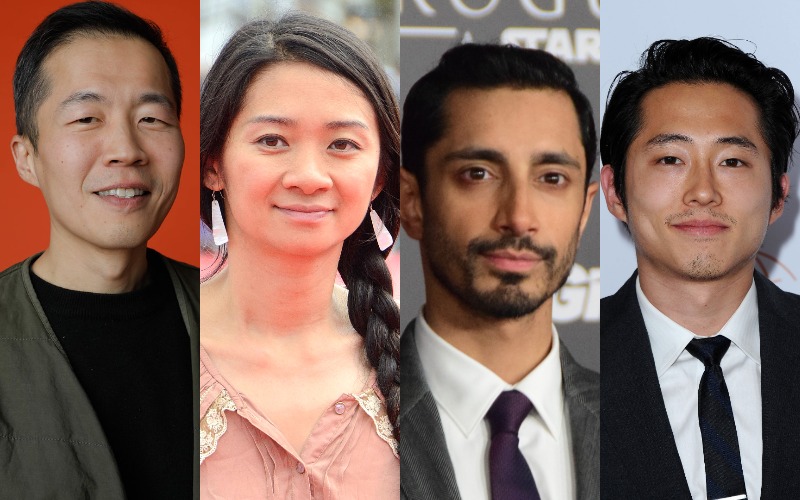Asian talent in the filmmaking industry broke through decades of erasure on Monday to secure a number of history-making Oscars nominations with the Academy of Motion Picture Arts and Sciences’ announcement of contenders.
This year, Asian-centered talent and films picked up more than 15 nominations.
- “Minari” is now the first Asian American-produced, directed and cast film to be nominated for best picture..
- Steven Yeun made history as the first Asian American actor nominated in a lead acting category.
- Youn Yuh-jung is the first Korean to capture a nomination for best supporting actress.
- Lee Isaac Chung, the filmmaker behind “Minari,” will be up for best director as well as best original screenplay. He is the second Asian American after M. Night Shyamalan to be nominated for best director.
- Producer Christina Oh also became the first Asian American woman to receive a nomination for best picture.
- The film received additional recognition for its score.
- “Nomadland” won a nomination for best picture and shattered a number of barriers.
- Chloé Zhao broke through the best director category, becoming the first woman of color ever nominated.
- Zhao and Emerald Fennell, director of “Promising Young Woman,” also made history in marking the first time more than one woman director has received a nod in the awards’ 93 years.
- The movie received additional nominations for best actress, adapted screenplay, cinematography and editing.
- British Asian actor Riz Ahmed, star of “Sound of Metal,” became the first Muslim person nominated for best actor. He and Yeun join a small group of people with Asian heritage who have received recognition in the category.
- He is also the first-ever person of Pakistani descent nominated for acting.
- “Over the Moon”—the first animated movie distributed by a major Hollywood studio to center on an entirely Asian cast—was awarded a nomination for best animated feature film.
- “Mulan” received two nominations for best costume design and best visual effects.
- Read the full list.
“Hollywood has finally started recognizing Asian/American stories and artists for what they are: box office draws and award-worthy!” tweeted Nancy Wang Yuen, a sociologist who specializes in race and ethnicity in film, television, and new media.
- “I think about how Steven Yeun went from having to audition for a 5-line role after #TheWalkingDead to becoming the first Asian American actor to be nominated for a Best Actor Oscar,” Yuen added in another tweet.
The nominations come amid a spike in anti-Asian hate in the U.S.
The film industry has a long history of shutting out Asian talent.
- Hollywood has frequently stereotyped Asian people as exotic kung fu masters, unsavory nerds, and submissive and meek, among other tropes.
- Meanwhile, films whitewashed Asian characters, a practice that still exists today.
- And despite the best picture win that catapulted “Parasite” to fame at the Oscars last year, the film received no acting nods.
The Golden Globes was swept in controversy last month after nominating “Minari” for best foreign language film—but not best picture—even though the movie is American-made and tells an American immigrant story.
- The Hollywood Foreign Press Association claimed the nomination was because a non-English language is spoken in over 50% of the film, but Quentin Tarantino’s “Inglourious Basterds”—with a largely white cast—didn’t receive the same treatment despite featuring English in only 30% of the film.
- Lulu Wang’s “The Farewell” was placed in the foreign language category for the same reason in 2019.
- Critics have pointed out that it’s common for American households to speak more than one language due to the country’s immigrant population.
Diversity and inclusion remains an ongoing effort for the academy. This year, nine of the 20 acting nominations went to people of color, the New York Times reports.
- After the academy faced backlash for #OscarsSoWhite due to all-white acting nominations in 2015 and 2016, the organization invited more women and people of color into its ranks.
- “Are this year’s Oscar nominations more diverse and inclusive than the Golden Globes? Yes,” journalist Dino-Ray Ramos wrote for Deadline. “But as mentioned, the bar was low. We are able to see some slow and steady change as a result of the Academy’s effort to bolster inclusivity with its membership—but there is always room for improvement.”
- “It’s not really an #OscarSoWhite kind of year,” Ramos added. “It’s more like an #OscarsKindOfWhite year.









